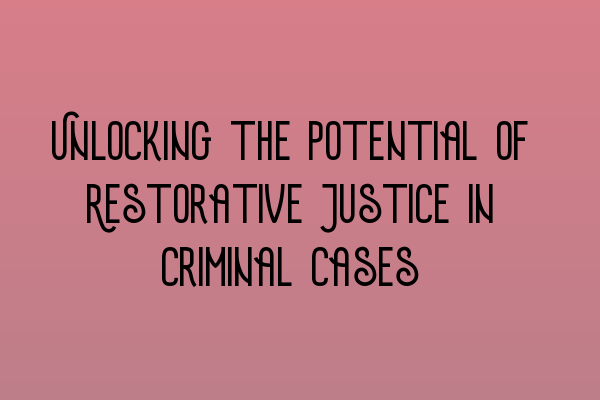Unlocking the Potential of Restorative Justice in Criminal Cases
Restorative justice has gained significant recognition as a powerful alternative to traditional criminal justice approaches. By focusing on repairing the harm caused by crimes, restorative justice offers a unique opportunity for healing and reconciliation. In this article, we will explore the potential of restorative justice in criminal cases, highlighting its benefits and the role it can play in transforming our legal system.
Understanding Restorative Justice
Restorative justice emphasizes the involvement of all stakeholders – victims, offenders, and the community – in the criminal justice process. Rather than focusing solely on punishment, it seeks to address the underlying causes of criminal behavior and promote accountability, healing, and reintegration. By facilitating dialogue and understanding between the parties involved, restorative justice aims to achieve meaningful resolutions that restore harmony, empower victims, and support the rehabilitation of offenders.
The Benefits of Restorative Justice
Restorative justice offers numerous benefits compared to traditional punitive approaches. Firstly, it provides victims with a chance to be heard, express their feelings, and have a say in the outcome of the case. This can help them find closure, regain a sense of control, and reduce the long-lasting trauma often associated with a criminal act. Additionally, restorative justice can contribute to the reduction of recidivism rates by addressing the root causes of criminal behavior and promoting offender accountability and rehabilitation.
Moreover, restorative justice can foster stronger community bonds by involving community members in the resolution of conflicts. By engaging in dialogue and understanding the impact of crimes, the community gains a better understanding of the challenges faced by victims and offenders, leading to increased empathy and support for their reintegration into society.
Implementing Restorative Justice in the UK Legal System
While restorative justice programs have been successfully implemented in various jurisdictions around the world, their integration into the UK legal system is still evolving. However, the increasing recognition of the benefits of restorative justice has led to pilot programs and legislative reforms aimed at unlocking its full potential.
The SQE Criminal Law & Practice Law UK recognizes the importance of restorative justice and is committed to promoting its utilization in criminal cases. By offering comprehensive training and resources, we aim to equip aspiring solicitors with the necessary knowledge and skills to effectively engage with restorative justice processes. Our SQE 1 Practice Exam Questions and SQE 1 Practice Mocks FLK1 FLK2 are designed to enhance your understanding of restorative justice principles and their application in real-world scenarios.
Furthermore, our SQE 2 Preparation Courses and SQE 1 Preparation Courses provide comprehensive training on the theoretical aspects and practical skills necessary to engage in restorative justice processes effectively. With our guidance, you can develop the expertise needed to navigate complex criminal cases and advocate for the adoption of restorative justice practices.
Stay informed about the latest developments in the application of restorative justice in criminal cases and the upcoming SRA SQE exam dates by visiting our website regularly. Together, we can harness the power of restorative justice to create a more just and compassionate legal system.
Unlock the potential of restorative justice today!
Disclaimer: This blog post is for informational purposes only and does not constitute legal advice. Consult a qualified solicitor for professional guidance on your specific legal matter.
